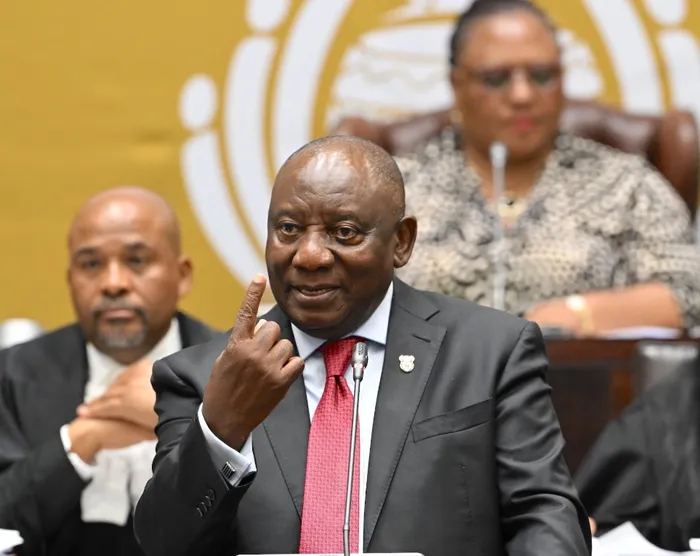
Another attempt to prosecute President Cyril Ramaphosa over the theft of US$580,000 in cash from his Phala Phala farm has failed and proved costly for the Society of the Protection of Our Constitution.
Image: Siyabulela Duda / GCIS
The Gauteng High Court has dismissed its attempt to prosecute President Cyril Ramaphosa over the theft of US$580,000 from his Phala Phala farm. Not only did the society's case fail, but the court also ordered it to bear the legal costs incurred by Ramaphosa during the proceedings.
The Society had sought a summons compelling the Director of Public Prosecutions, Pretoria, Sibongile Mzinyathi, and National Director of Public Prosecutions, Shamila Batohi, to ensure Ramaphosa's appearance in court based on the provisions of the Criminal Procedure Act (CPA). This act outlines the legitimate methods for securing the attendance of an accused individual, including arrest and summons.
However, as the society's case was withdrawn in July 2023, Ramaphosa argued that their application lacked the necessary legal competence. The court, presided over by Acting Judge Jacques Minnaar, was unconvinced by the society's justifications and highlighted their failure to take the court into confidence regarding the case's motivations and goals.
In his ruling on September 2, Judge Minnaar noted that the society had legal representation at all times during the case and had been offered the opportunity to withdraw their application ahead of time. "No shred of justification is provided for why the main application was indeed brought and then withdrawn," he stated. There was also no basis to shield the society from costs despite its unsuccessful attempt to navigate the prosecutorial process.
Moreover, Ramaphosa had previously warned the society that if they persisted in pursuing the application after filing their answering affidavit, they would be submitting to the court that the organisation should not benefit from the Biowatch principle. This principle typically protects entities engaging in disputes concerning constitutional rights against the state from being liable for the state's legal costs - a safeguard that the court effectively overturned in this instance.
Despite the failed prosecution, the society's legal team, Zehir Omar Attorneys, had conveyed to Ramaphosa’s legal representatives that their client would not continue with the application. Nevertheless, Ramaphosa’s lawyers demanded a formal withdrawal, leading to continued disputes over the authority of representation.
In the end, the court ruled that the society must pay Ramaphosa's costs for the main application summoning him to the Pretoria Magistrate's Court, on scale A, the lowest scale, reflecting the default position in the absence of a specified scale.
As this legal episode concludes, it raises important questions about accountability and the extent to which organisations can pursue claims against public officials in South Africa. The Society of the Protection of Our Constitution, previously characterised as a non-existent entity, did not respond to requests for comment on the rulings made by the court.
IOL
Related Topics: